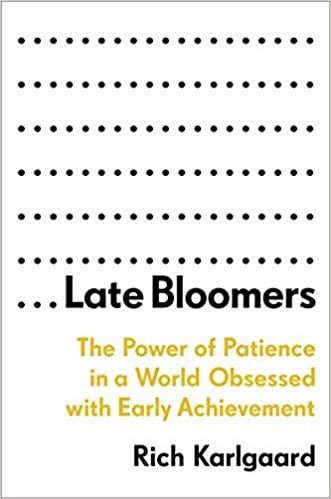You have /5 articles left.
Sign up for a free account or log in.
 Late Bloomers: The Power of Patience in a World Obsessed with Early Achievement by Rich Karlgaard
Late Bloomers: The Power of Patience in a World Obsessed with Early Achievement by Rich Karlgaard
Published in April of 2019.
Late Bloomers was not written as a career guide for non-traditional academics, but it could have been.
Alternative academics are, almost by definition, late bloomers.
The sheer length of time it takes to earn a PhD puts most alt-acs into their thirties by the time that their non-traditional academic careers get launched. Add to this late start the non-legible career path of alternative academics, combined with a lack of opportunities for internal advancement.
The net result is that most alt-ac careers are anything but rapid. There are very few alternative academic wunderkinds.
Those of us on the slow alternative academic path can take solace in Late Bloomers. According to Rich Karlgaard, a late blooming entrepreneur, and journalist and author, the best career outcomes come to those who wait. Older professionals may not have the stamina or exuberance of the under forty crowd, but they more than compensate with higher levels of insight and patience and wisdom.
Higher ed is an industry that lacks the youth obsession of tech companies. (Tell me if this is wrong). We are surrounded by young people. But mostly, they are our students - not our colleagues. If anything, higher ed suffers from making too little space for early career folks to enter the profession.
Still, academia is not immune from celebrating the accomplishments of young scholars while neglecting the sustained contributions of seasoned educators. For traditional academics, markers of career progression tend to follow that of promotion from assistant to associate to full professor. These external validators of academic career success can neglect the expertise of those not on the tenure track.
For non-traditional academics, career advancement often requires a move to a different institution. Many alternative academics will forgo national job searches, as they may be tied to a particular geographic area as a result of family obligations or a non-portable partner. Non-traditional academics may gain some insights from reading Late Bloomers in how to think about their career arcs. An over-reliance on job titles or external validation may be particularly problematic for academics not on the tenure track.
Beyond making us alt-acs feel better about our winding career paths, many of the ideas in Late Bloomers deserve to circulate in the bloodstream of higher ed thinking.
Perhaps the most important bad idea that Late Bloomers exposes is that our students - and our kids - need to find their “passion” early in life. Rather than exhorting college graduates to “make an impact,” we might be wiser to counsel emerging adults to take their time.
As a parent of two kids in their early twenties, I found Late Bloomers helpful in relieving some of my worries. As Karlgaard explains, the brains of most people in their twenties are not developed to the point in which long-term thinking is optimized. Most people under 25 are incapable of the sort of impulse control and judgment that we expect from adults.
Late Bloomers is cogently argued, loaded with evidence, and expertly put together.
Are you a late blooming alternative academic?
What books have helped you make sense of your academic career path?
What are you reading?




